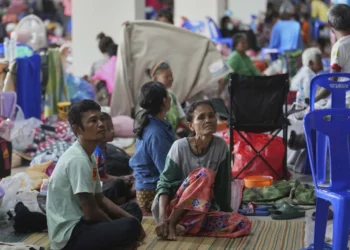House Minority Leader Hakeem Jeffries (D-NY) criticized the White House for not yet briefing the “Gang of Eight” on Capitol Hill over the strikes in Iran that took place Saturday night.
The “Gang of Eight” consists of the top members in both chambers, including Senate Majority Leader John Thune (R-SD), Senate Minority Leader Chuck Schumer (D-NY), House Speaker Mike Johnson (R-LA), and Jeffries, along with the top members of the House and Senate Intelligence committees. Jeffries said the group has yet to be briefed on the strikes aside from “courtesy calls” that the four members of leadership received.
KAROLINE LEAVITT SAYS HAKEEM JEFFRIES DID NOT ANSWER ‘COURTESY’ CALL ON IRAN STRIKES
“I asked for a gang of eight briefing,” Jeffries told reporters at a press conference Monday. “It has yet to occur, and it’s not clear to me what the administration is hiding from Congress and from the American people, if they have a case to make, come up to Capitol Hill and make it.”
The White House gave “courtesy calls” to Thune, Schumer, Johnson, and Jeffries ahead of the strikes, but the White House said Jeffries “couldn’t be reached” before the attack took place.
“First of all, we did make bipartisan calls,” White House press secretary Karoline Leavitt said Monday on Fox & Friends. “The White House made calls to congressional leadership. They were bipartisan calls. In fact, Hakeem Jeffries couldn’t be reached.”
Jeffries pushed back the argument that the Trump administration did not brief members, beyond top leadership, due to leaks, saying they can not point to a “single example” where a briefing with the group was disclosed. He further called on the White House to provide an “immediate” briefing to the group.
“I learned about this strike last night on Twitter, which, as you point out, is an uncomfortable thing for the ranking member of the Intelligence Committee, particularly given the fact that the whole premise here is that something changed,” House Intelligence ranking member Jim Himes (D-CT) said on CNN.
“As a member of the Gang of Eight, you might think that for something this consequential, we would be informed of any change of intelligence,” he later added.
Since the strikes, Himes and Senate Intelligence ranking member Mark Warner (D-VA) cited that the Constitution states the power to authorize war lies with Congress.
The Senate and the House are scheduled to be briefed on Iran on Tuesday afternoon, where tensions will likely run high as many members are split on the matter.
“On Tuesday at 3:00 pm, a classified briefing will be held for the House of Representatives on the situation in the Middle East,” Jeffries wrote in a letter Monday.
“The administration bears the burden of justifying their recent actions, demonstrating that the strike on Iran’s ‘completely and totally obliterated’ its nuclear program and explaining how the United States will avoid being dragged into another prolonged war in the Middle East that could risk thousands of American lives,” Jeffries wrote.
Later Monday, Iran launched a missile attack against a U.S. military base in Qatar in retaliation for the U.S. bombing three of its nuclear facilities over the weekend. Trump said no Americans were harmed in the strike, and he thanked Iran for giving the U.S. a heads-up.
Trump then announced that Iran and Israel agreed to a ceasefire that may soften the outrage in Congress, especially from Democrats who argue Trump’s military action required congressional authorization.
This week, the Senate was poised to vote on a War Powers Resolution barrels. Sen. Tim Kaine (D-VA) pushed for a vote in the upper chamber on his resolution, which requires congressional debate and a vote before the U.S. takes any further offensive measures against Iran. Kaine introduced a similar resolution in 2020 regarding Iran that eight GOP senators backed.
Reps. Thomas Massie (R-KY) and Ro Khanna (D-CA) introduced their version of a bipartisan war powers resolution, signaling they may force a vote on the matter. The resolution has 15 original co-sponsors.
MASSIE LEADS BIPARTISAN HOUSE RESOLUTION TO LIMIT TRUMP’S WAR POWERS
The War Powers Resolution was passed in 1973 in response to former President Richard Nixon’s overreach in the Vietnam War. He vetoed the bill, but with a two-thirds vote in both chambers, Congress was able to override the veto.
The resolution requires the president to notify Congress within 48 hours of introducing troops into hostilities. It allows them to be deployed for a maximum of 60 days, with a possible 30-day extension, without congressional approval. Congress has the power to end this deployment through a joint resolution.















